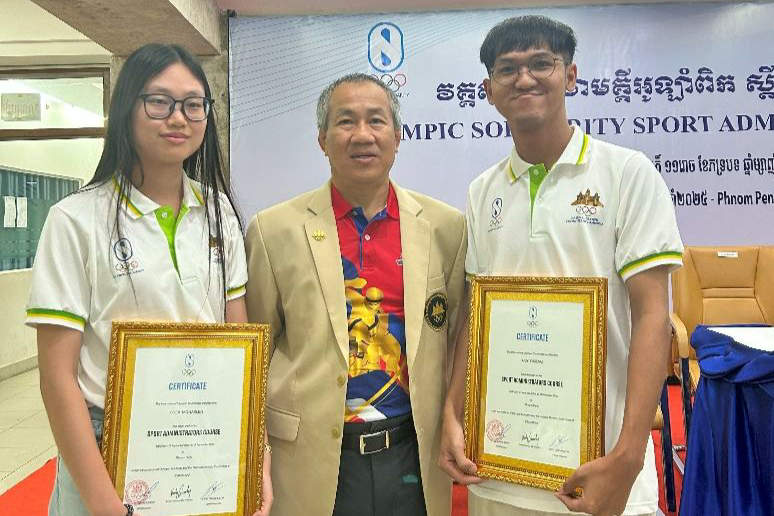1 official and 1 fencer joined the Sport Administration Course 2025
23 September 2025, Phnom Penh
As part of its ongoing efforts to strengthen the fencing sports community, the Fencing Federation of Cambodia (FFC) sent two representatives – an administrator and a fencer from CamEd Fencing Club, Mr. Huy Lysieng and Ms. Chea Monaklen – to attend the 2025 Sport Administrations Course, held from 15th to 18th September 2025 at the National Olympic Committee of Cambodia (NOCC).
The Sports Administration course 2025 is an Olympic Solidarity course hosted by the National Olympic Committee of Cambodia (NOCC) to promote leadership within the national sports community to participants from the national sports federations. The course covered important grassroots-level topics, ranging from athlete development to the team behind the athlete, sports event planning, governance, and leadership. Led by five experienced deputy coaches, including Dr. Sok Saroeun, Chairman of the Medical and Sports Science Committee, who covered “Sports Medicine” on 15th September, Mr. Prum Vannaroeun, Deputy Head of the Cambodia Anti-Doping Agency, covered “Anti-Doping Agency” on 16th September, Mr. Em Hieng, a permanent advisor to the NOCC, covered “The Organization of Sports Events” on 16th – 17th September, Mr. Buy Sophoan, also a permanent advisor to the NOCC, covered “History of the Olympic, and the Sports Structure” on 17th September, Mr. Nay Phonna, an NOCC permanent advisor, covered “Fair play, and Young Talent Recruitment” on 18th September, last but not least, Mr. Vath Chamroeun, Secretary of State for the Ministry of Education, Youth and Sport, and the Secretary General of the National Olympic Committee of Cambodia, covered “Sports Leadership” on 18th September.
As both an athlete and an administrator of a fencing club, the Sports Administration Course had a profound impact on Ms. Chea Monaklen and Mr. Huy Lysieng. The knowledge and insights they gained now serve as a strong foundation to reinforce their respective roles in the fencing community.
During the Sports Medicine session, two major topics were addressed: Performance Enhancement and Injury Management. Dr. Sok Saroeun emphasized that improving athletic performance is never a one- size-fits-all process; it varies depending on the athlete’s sport (whether it demands greater strength or endurance), their physical conditioning, and their training goals. On the subject of injury management, he explained the causes of common sports injuries and shared practical solutions for prevention and recovery.
Another recurring theme highlighted by nearly all the deputy coaches was ADEL – the Anti-Doping Education and Learning Platform. In the session led by Mr. Prum Vannaroeun, participants were introduced to key international and national organizations in the anti-doping structure, including UNESCO, the World Anti-Doping Agency (WADA), and National Anti-Doping Organizations (NADOs). Through case examples, the session underscored the importance of implementing the World Anti-Doping Code to ensure fair play and clean sport worldwide. One particularly eye-opening insight was that if a country’s NADO is deemed ineligible, its national flag cannot be represented on the international stage, although its athletes could still be taking part in the events.
In the Organization of Sports Events class, Mr. Em Hieng guided participants through the process of designing a successful sporting event – defining its objectives, establishing its structure, and determining the appropriate competition format. He also demonstrated the different models used to structure competitions. Figure 2 below contains the 7 types of sports competition formations introduced in the course.
Beyond these technical aspects, the course also touched on broader knowledge areas. In his session, Mr. Buy Sophoan explored the history of the Olympics, tracing its origins from ancient Greece to the birth of the modern Games, while also examining the sports industry’s infrastructure and philosophy.
The importance of Fair Play was addressed by Mr. Nay Phonna, who also emphasized young talent recruitment as a critical factor in the sustainable development of sports.
Finally, the course concluded with a powerful session on Sports Leadership by Mr. Vath Chamroeun. He reminded participants of one central truth: “The leaders in sports are none other than the athletes themselves. Without athletes, there are no sports.” To reinforce this message, he shared a theoretical framework designed to help athletes and administrators alike raise the standards of sportsmanship and leadership within their communities
Overall, the 2025 Sports Administration Course proved to be a valuable platform for knowledge- sharing, professional growth, and the exchange of ideas among Cambodia’s sports community. With insights ranging from sports medicine and anti-doping to leadership and fair play, the course not only broadened the participants’ understanding of the sports ecosystem but also reinforced the importance of integrity, structure, and vision in building a sustainable future for Cambodian sports.
-- By CHEA Monaklen

